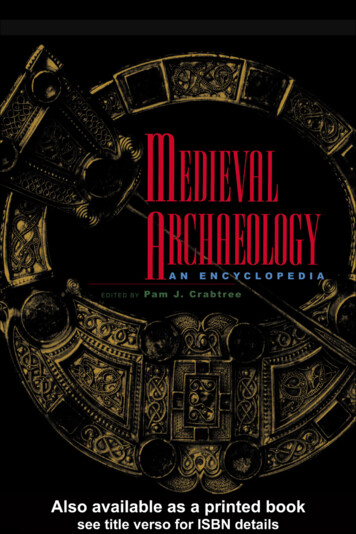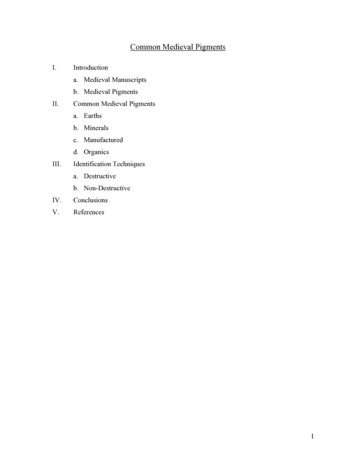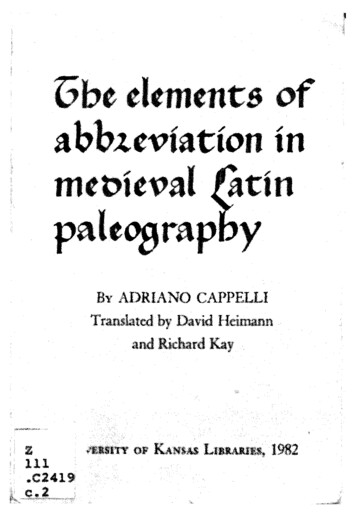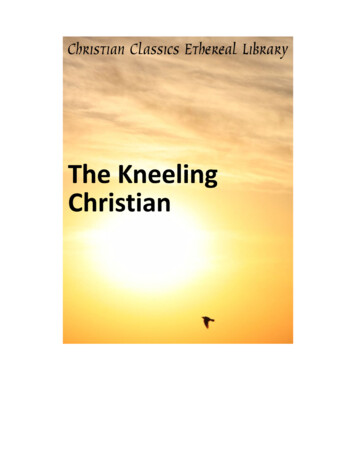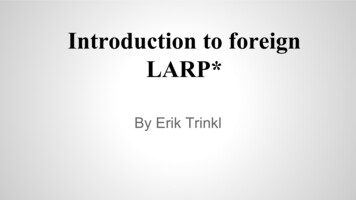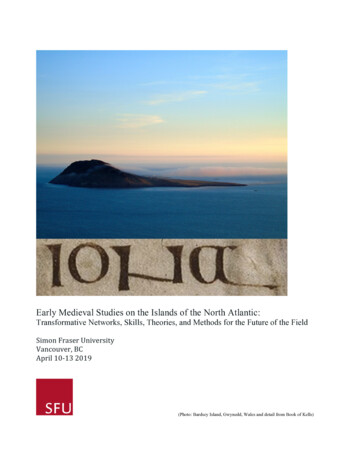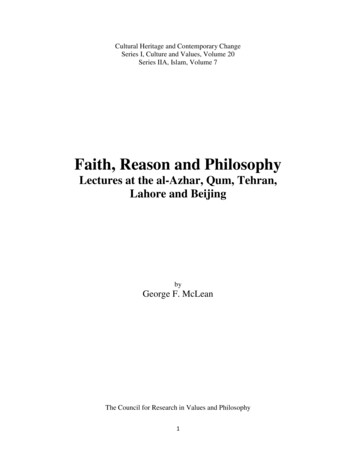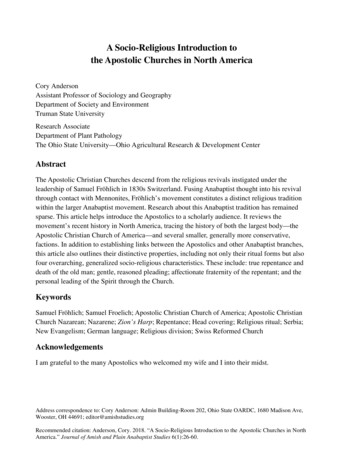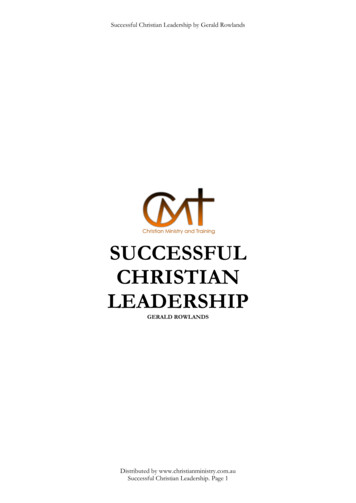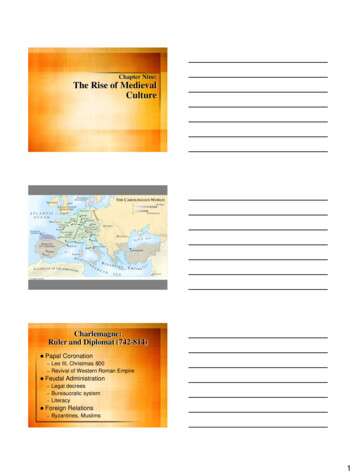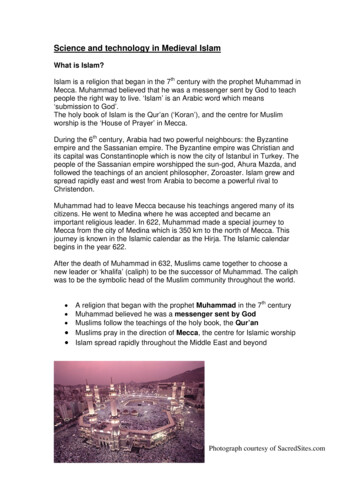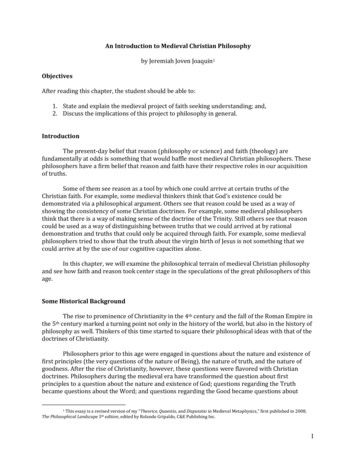
Transcription
An Introduction to Medieval Christian Philosophyby Jeremiah Joven Joaquin1ObjectivesAfter reading this chapter, the student should be able to:1. State and explain the medieval project of faith seeking understanding; and,2. Discuss the implications of this project to philosophy in general.IntroductionThe present-day belief that reason (philosophy or science) and faith (theology) arefundamentally at odds is something that would baffle most medieval Christian philosophers. Thesephilosophers have a firm belief that reason and faith have their respective roles in our acquisitionof truths.Some of them see reason as a tool by which one could arrive at certain truths of theChristian faith. For example, some medieval thinkers think that God’s existence could bedemonstrated via a philosophical argument. Others see that reason could be used as a way ofshowing the consistency of some Christian doctrines. For example, some medieval philosophersthink that there is a way of making sense of the doctrine of the Trinity. Still others see that reasoncould be used as a way of distinguishing between truths that we could arrived at by rationaldemonstration and truths that could only be acquired through faith. For example, some medievalphilosophers tried to show that the truth about the virgin birth of Jesus is not something that wecould arrive at by the use of our cognitive capacities alone.In this chapter, we will examine the philosophical terrain of medieval Christian philosophyand see how faith and reason took center stage in the speculations of the great philosophers of thisage.Some Historical BackgroundThe rise to prominence of Christianity in the 4th century and the fall of the Roman Empire inthe 5th century marked a turning point not only in the history of the world, but also in the history ofphilosophy as well. Thinkers of this time started to square their philosophical ideas with that of thedoctrines of Christianity.Philosophers prior to this age were engaged in questions about the nature and existence offirst principles (the very questions of the nature of Being), the nature of truth, and the nature ofgoodness. After the rise of Christianity, however, these questions were flavored with Christiandoctrines. Philosophers during the medieval era have transformed the question about firstprinciples to a question about the nature and existence of God; questions regarding the Truthbecame questions about the Word; and questions regarding the Good became questions about1 This essay is a revised version of my “Theorice, Quaestio, and Disputatio in Medieval Metaphysics,” first published in 2008,The Philosophical Landscape 5th edition, edited by Rolando Gripaldo, C&E Publishing Inc.1
Divine Providence. At the heart of these questions is the question about the relationship betweenthe truths of faith and the truths of reason. The main issue at stake is whether the truths derivedfrom the doctrines of faith are compatible with the truths arrived at by the use of natural humanreason alone.It is important to understand that this transition came at a time of great changes in thesocio-political atmosphere of the western world. The political deterioration of the Greco-Romanempire during the sixth century caused a spiritual turmoil. This spiritual turmoil in turn gave rise tothe political influence of Christianity, which in turn made significant changes to the mode thinkingof the philosophers of that time. The prevailing philosophical questions at that time reflect thischange.A crucial feature of this transition was the change of the role of philosophy. WithChristianity in the philosophical foray, some thinkers of the day were exposed to some new andquite alien ideas and concepts. A natural struggle between two opposing poles soon ensued. On theone hand, educated people of that time were trained along the ideas of the Greeks: like, Aristotleand Plato. On the other hand, a new philosophical force, Christianity, exposes them to the idea thatthe way, the truth and the life has come to shed light to the world. The Apostle Paul reflects thisstruggle:While Paul was waiting for them in Athens, he was distressed to see that the citywas full of idols. So, he argued in the synagogue with the Jews and the devoutpersons, and also in the marketplace every day with those who happened to bethere. Also some Epicurean and Stoic philosophers debated with him. Some said,“What does this babbler want to say?” Others said, “He seems to be a proclaimer offoreign divinities.” (This was because he was telling the good news about Jesus and theresurrection.) So they took him and brought him to the Areopagus and asked him,“May we know what this new teaching is that you are preaching?” (Acts 17:16-25).2With the thirst for revitalizing their spirituality, these thinkers and philosophers asked Paulabout his beliefs. Paul readily obliged:Athenians, I see how extremely religious you are in every way. For as I wentthrough to the city and looked carefully at the objects of your worship, I foundamong them an altar with the inscription, ‘To an unknown god’. What therefore youworship as unknown, this I proclaim to you. The God who made the world andeverything in it, he who is Lord of heaven and earth, does not live in shrines madeby human hands as though he needed anything, since he himself gives to allmortals life and breath and all things (op. cit).These words sparked a revolution of thought. What these philosophers were worshippingwas an “unknown god.” Here, then, right before their eyes, was someone telling them that what theywere really worshipping was none other than the one and only God.Giving a name to the “unknown god,” however, was not the only thing that Christianityoffered the Greco-Roman world. It also offered the salvation of the world through Christ. This idea2 All the primary sources quoted here came from two anthologies: Kaufman and Baird (1994) and Shapiro (1964). Where itapplies, all italics in the quoted works are mine.2
was repudiated, at first, by the philosophers. The question, “Why should the world be saved?”lurked in the minds of these philosophers. The Gospel of John tried to answer this:In the beginning was the Word and the Word was with God, and the Word wasGod. He was in the beginning with God. All things came into being through him, andwithout him not one thing came into being. What has come into being in him was lifeand the life was the light of all people. The light shines in the darkness, and thedarkness did not overcome it The true light, which enlightens everyone, wascoming into the world. He was in the world, and the world came into being throughhim yet the world did not know him. He came to what was his own, and his ownpeople did not accept him. But to all who received him, who believed in his name, hegave power to become children of God And the Word became flesh and livedamong us, and we have seen his glory, the glory as of a father’s only son full of graceand truth From his fullness we have all received, grace upon grace. The law indeedwas given through Moses, grace and truth came through Jesus Christ. No one hasever seen God. It is God the only Son, who is close to the Father’s heart, who hasmade him known. (John 1:1-18).What this salvation is salvation from darkness. Darkness, as it is here depicted, is our failureto acknowledge the presence of God. The idea that “the true light gave the world its life, and it cameinto the world in order to give grace and truth” is a crucial idea for the Christian faith because thetrue light—viz. Jesus Christ—came into the world to proclaim the presence of God. True knowledge,then, entails believing in Christ. Salvation is given only to those who follow him.Of course, not everyone accepted this idea. For some philosophers, it was poorlyconstructed thought that has no proof. These philosophers have found several inconsistencies,which they raised against the Christian faith: How can an all-powerful God actively intend to createa world such as ours? Why did a God become a man? How can the same Son be his own Father all atthe same time?When Christianity came into the western world, it brought about noticeable changes. In theearly days of Christianity, philosophers trained in the Platonic and Aristotelian schools wereintellectually superior to the Christians. While the former have sophisticated philosophical systems,the latter have a poorly constructed metaphysics. Such a case would lead us to think thatChristianity could never come into terms with philosophy. Two points, however, are important tonote here. First, both Platonic and Aristotelian doctrines are open to the possibility of integrationwith the Christian faith. Consider the idea of the Platonic Good and the Aristotelian NecessaryCause. If we were to extend the arguments presented for these two ideas, we could arrive at theidea of the Christian God. Consider also the Platonic idea of the Soul and the Aristotelian idea ofSubstance. Taken together, they lead us to the Christian doctrine of salvation. Second, given thepossibility of integrating philosophy and Christianity, several interesting philosophical problemswould inevitably arise. These problems distinguish medieval philosophy from other historicalepochs of philosophy.Faith and ReasonThroughout the epochs of medieval Christian philosophy, there have been differentformulations of the relationship between faith and reason: theology and philosophy. These3
formulations can be grouped into four types: extreme fideism, moderate fideism, moderaterationalism and extreme rationalism.The Church Fathers and the Mystics belong to the first type.3 The Greek Christian Apologist,Clement of Alexandria, sees that relationship between and reason as follows:Perchance, too, philosophy was given to the Greeks directly and primarily, tillthe Lord should call the Greeks Philosophy, therefore, was a preparation, pavingthe way for him who is perfected in Christ Philosophy exercises the mind, rousesthe intelligence, and begets an inquiring shrewdness, by means of the truephilosophy, which the initiated possess, having found it, or rather received it, fromthe truth itself. (Stromata, Bk. 1, Ch. 5).Extreme fideism is the idea that it is impossible to reconcile faith and reason inasmuch astrue knowledge of things is concerned. Reason, on the one hand, only exercises the mind and rousesthe intellect. Thus, it would lead only to agnosticism or non-knowledge. Faith, on the other hand,leads to true knowledge, for its truths came from the truth itself (Christ himself). Thus, faith issuperior to reason when it comes to knowledge.The second type includes Augustine and Anselm. In the Proslogium, Anselm formulates therelationship between faith and reason as follows:I do not endeavor, O Lord, to penetrate thy sublimity, for in no wise do Icompare my understanding with that; but I long to understand in some degree thytruth, which my heart believes and loves. For I do not seek to understand that I maybelieve, but I believe in order to understand. For this also I believe—that unless Ibelieved, I should not understand. (Proslogium, Ch. I)Moderate fideism is the idea that reason and faith can be reconciled inasmuch as trueknowledge of things is based on faith. Reason functions not as the source of true knowledge; it is,rather, a vehicle for understanding what is already known by faith. Faith is the basis of all our justbeliefs. Reason, on the other hand, makes us understand more what we already believe. Thus, weonly need reason to gain an understanding of what we already believe. Hence, Anselm states that“ unless I believed, I should not understand.” Reason, therefore, is not used to ascertain some ofour beliefs; we use reason, rather, to understand our knowledge acquired through faith.The pre-Scholastics, like Abelard and Albert the Great, and the Scholastics, like Aquinas andDun Scotus, are typical of moderate rationalists. Aquinas argues that reason and faith arecompatible:For that with which the human reason is naturally endowed is clearly most true;so much so, that it is impossible for us to think of such truths as false. Nor is itpermissible to believe as false that which we hold by faith, since this is confirmed ina way that is so clearly divine. Since, therefore, only the false is opposed to thetrue it is impossible that the truth of faith should be opposed to those principlesthat the human reason knows naturally. (Summa Contra Gentiles, Bk. I, Ch. 7).3 The Early Church Fathers also include the Christian Apologists. There have been well-known apologists from the Greek andLatin traditions (See Gilson 1955, Parts 1 and 2). The later medieval period featured the loss of confidence of many Christians to thepower of reason to account for truths of faith. This was epitomized by the mystics such as Nicholas of Cues, Bonaventure and MeisterEckhart.4
Moderate rationalism is the idea that the truths derived from reason are compatible withthe truths acquired through faith. Aquinas’s argument suffices to support this claim. What is truecan never be false. The truths arrived at by use of reason and the truths acquired through faith areboth true. One truth is always compatible with another—since only what is false is incompatiblewith what is true. Hence, both these truths are compatible with one another.The fourth type includes the Latin Averroists4 such as Siger of Brabant, and the laterScholastics such as William of Ockham, Roger Bacon, and Nicholas of Autrecourt. William ofOckham formulates the relationship as follows: [A]ssuming that every truth necessary for salvation is theological, I maintainthat the same specific theological conclusion cannot be proved in theology and innatural knowledge, if we understand ‘knowledge’ [as the possession of just oneconclusion, whether this is a natural or theological]. because there are as manydistinct cognitions as there are distinct conclusions known. Hence, just as therecannot be different acts of knowledge of one conclusion, since plurality must not beasserted without necessity, so also the same conclusion cannot be proved indifferent sciences. (Quodlibeta, V, Q. 5)Extreme rationalism is the idea that truths arrived by reason are incompatible with truthsacquired through faith. Given that they are independent from one another, it seems that there is nolonger a need to reconcile the two. Ockham’s argument precisely shows this. Truths of reason werearrived at in a different manner from those truths acquired through faith. No particular truth,however, could be arrived at using different devices; i.e. two devices can never lead to the sametruth. Thus, truths arrived by reason is necessarily independent from the truths acquired throughfaith. But, independence of truths entails incompatibility of those truths. Hence, truths of reason areincompatible with truths of faith.These different formulations arrive at different strategies in solving different philosophicalproblems. But it should be noted here that each formulation assumes that there are truths of faithand truths of reason. Granted this assumption, each formulation should be seen as an attempt tostate the relationship between these two truths. The philosophical problems which medievalproblems tried to answer exist precisely because of their attempt to reconcile faith and reason.Corollary to this, these problems would not exist if such reconciliation were not attempted in thefirst place. This latter sentiment is evident in both extreme fideism and extreme rationalism.Quaestio, Disputatio and TheoriceMedieval philosophers, influenced by Plato and Aristotle, developed a unique blend ofphilosophical speculation (theorice). Philosophy qua philosophy is distinguished from other formsof theoretical speculations and explorations by its method and subject matter. For medievalphilosophers, the primary project is to explain the possibility of reconciling faith and reason. Fromthis basic question, several other questions can be pursued. As regards to their method, medieval4 Latin Averroists, also known as the Integral Aristotelians, became a philosophical force by the late 13 th century. They holdthat there are two truths: truths of reason and truths of faith. The latter are for those who are intellectually inferior, while the former arefor those who are intellectually superior.5
philosophers developed two unique methods of philosophical speculation: viz. quaestio anddisputatio.5Quaestio can be transliterated as “investigation” or “inquiry.” As a method in philosophy,quaestio, like any investigation or inquiry, starts out with some basic question about someparticular subject matter. A hypothesis is then given to answer it. To test this hypothesis, differentpossible objections are raised against it. If it passes the first set of objections, another set will beraised. If, again, the hypothesis passes this, then a probable conclusion about the original questionis arrived at. This conclusion is probable in the sense that, in the course of the quaestio, there is stillroom to deny it.There are two exposition styles of the quaestio method. The first type is a philosophicaldialogue. Most medieval philosophers influenced by Plato used a dialogue-style of exposition.Augustine’s On the Free Choice of the Will is an example of this. The second type is a philosophicaltreatise. Medieval philosophers influenced by Aristotle used this type. Aquinas’s Summa contraGentiles is an example of this.Another method of philosophical speculation, and often acknowledged as the method ofmedieval philosophizing, is called disputatio. Disputatio can be transliterated as “debate” or“dispute.” This method traces its history from Abelard’s Sic et Non and Lombard’s Sentences.Disputatio is characterized as a meeting of two opposites. Abelard’s version starts with an inquirerpresenting two contradictory positions regarding a particular subject matter. Arguments for eachposition are then given to support each claim. Each argument is then analyzed and scrutinized inorder to test its validity and soundness. To settle the issue, logically consistency is the only factor. Alogically consistent position is often declared as the most reasonable position; and hence is theright position. If both positions are logically consistent, an appeal to scriptural authorities—biblicalScholars and/or the fathers and doctors of the Church—is needed to settle the issue. If bothpositions are found wanting of logical consistency, in order to settle the issue the only recourse is toappeal to the Holy Scriptures (and not merely to the Scriptural authorities). Ever since Abelard’swork became an established primary text, most medieval philosophers who came after him usedhis method to present their theorice.Aquinas is often acknowledged as an exemplar of the disputatio method. His version of itstarts with a general question (quaestio). It serves as the main topic of the inquiry. It is then dividedinto several articles (articulos). Each article is formulated in a question form. Instead of answeringeach of these directly, one proceeds (proceditur) with a tentative answer contrary to what oneintends to give later (propositio contrarium). This tentative answer is then supported by a set ofarguments called “objections.” The whole inquiry then will subtly change with a counterpoint (sedcontra). This is done usually by quoting an argument or a proposition made in the Holy Scripturesor by an intellectual authority (like Aristotle). What this does is to introduce the intended answerthat is being put forward. The whole argument then for the intended answer is given (respondeo).After showing this argument, the inquiry proceeds by meeting each of the objections. This is doneby giving a reply to each of the points of each objection. This ends the disputatio.Some early medieval philosophers used the quaestio method to present their theorice. But inthe course of the history of medieval philosophizing, the disputatio method became a more5See Adler and van Doren (1972, 280-285) and McKinney (1983).6
preferred method for the late medieval philosophers. William of Ockham, Siger of Brabant, DunsScotus, and Jean Buridan exemplify this.Natural Theology, Divine Theology, and MetaphysicsAlthough medieval philosophy is often dubbed as theo-centric (God-centered), it is not,however, purely concerned with topics under what we now call as “theology.” Etymologicallyspeaking, “theo-logos” is defined as “the reason behind God.” If we follow this definition, we mgihtsay that theology is the examination of the reasonability of our idea of God.It is, however, important to note that the word “theology” only attained its meaning throughits usage during the medieval period. Some prominent medieval philosophers owe much of theirconceptions of theology from Greek philosophers, especially Aristotle. Thus, it is probablyimportant to discuss, although quite ironically, how Aristotle viewed the nature of theology. And itis from his Metaphysics that we will see how he arrived at this idea.Aristotle’s investigations concerning theology could be reconstructed as follows:“All human beings by nature desire to know. Desiring knowledge leads to desiring wisdom.Wisdom now is the knowledge about certain first principles and ultimate causes. To engage in thepursuit of wisdom is to engage in philosophy. Hence, human beings begin to philosophize becauseof this basic human nature. Puzzled people often think of themselves as ignorant. Theyphilosophized, then, in order to escape such ignorance. That is, they want to have knowledge. Toacquire knowledge is to know the first causes of things.“There are four senses of the word “cause.” A cause may be a material cause, which are thematerials that make up a thing. It may be a formal cause, which are the essential features of a thing.It may also be an efficient cause, which is the author or maker of some particular thing. It may evenbe a final cause, which is the purpose of some particular thing.“Knowledge of the first causes of things makes possible real knowledge. But if there hadbeen an infinite number of causes, then real knowledge would have been impossible. Hence, if wehave real knowledge, the causes of things are neither an infinite series nor infinitely various.“We are seeking the principles and the causes of things that are. We could seek themthrough natural sciences, which are concerned with facts of the world; mathematics, which isconcerned with formal truths; and theology, which is concerned with what is divine and beyondnature. If there is no substance other than those which are formed by nature, natural science will bethe first science. But if there is an immovable structure, the science of this must be prior and mustbe first philosophy, and universal in this way, because it is first. And it will belong to this to considerbeing qua being. There is such an immovable structure. Therefore, a first philosophy, which isconcerned with the principles and the causes of things, exists.” 6This first philosophy is, as it was interpreted by medieval philosophers, nothing else buttheology. Since, a first philosophy deals with questions like “Why is there something rather thannothing?” it seems that, for medieval philosophers, theology ought to answer such questions aswell.6The following are taken from Aristotle’s Metaphysics (982a-1026a).7
Theology, properly understood, has two senses.7 First, theology is understood as a body ofdivinely revealed knowledge giving an explanation for everything. There are two ideas here thatobviously need some clarification, viz. “divinely revealed” and “explanation for everything.” What ismeant by “divinely revealed” can be seen in relation with the idea of God. Knowledge divinelyrevealed is nothing more than knowledge coming directly from God. So, the sense of theology herebeing described is that God directly gave us knowledge, and such knowledge is the explanation foreverything. But how do we understand the idea “explanation for everything”? An explanation foreverything is none other than God himself. So, in effect, what this sense of theology is trying to pointout is the fact that we have knowledge of God (explanation for everything) from God himself(divinely revealed). This is now what is called divine theology. This, however, is hard to fathom,since we may ask how such knowledge can be arrived at.Divine theology speaks of no other source than faith. Truth is attained through God’srevelation. And this truth can be attained only by faith. God, who revealed himself to us, is taken asa basic idea. We no longer need to prove the existence of God. And the doctrines of faith (SacraDoctrina) will justify this. What is philosophically interesting here, however, as some medievalphilosophers of the moderate fideism type held, is that knowledge about God seems to entailparadoxical problems. These include the consistency of attributing to God the property of being AllGood and All-Knowing, understanding the Holy Trinity, and understanding the idea of creation exnihilo. These problems would be entertained by the medieval philosophers, and later wouldproduce the discipline called philosophical theology.8The second way of understanding theology is called natural theology. One contemporaryphilosopher describes this as follows:Natural Theology is the enterprise of providing support for religious beliefs bystarting from premises that neither are nor presuppose religious beliefs. We beginfrom the existence of the world or with the definition of the concept “God” and wetry to show that when we think through the implications we are led to recognizethe existence of God. (Alston (1991, 289)).Natural theology need not support any religious doctrine. It seeks to answer thefundamental philosophical questions by the use of unaided human reason. In this sense, naturaltheology is akin to what Aristotle pictures as first philosophy, where reason is the source ofknowledge and rational arguments are used to prove some fundamental fact. The idea of God is nottaken as basic; it is seen as a natural consequence of philosophical inquiry.The difference between natural theology and divine theology lies solely in their startingpoints regarding the knowledge of God. Divine theology can be seen as a top-down philosophicalenterprise. That is, it starts with the idea of God and from there all things follow. On the other hand,natural theology can be seen as a bottom-up philosophical enterprise. That is, it starts with what we7 Kretzmann will be our guide in distinguishing between the two senses of the word “theology”; viz. Divine Theology andNatural Theology. See Kretmann(1997, 1-53) (1999, 1-29). His basic claim is that natural theology is strictly a philosophical discipline,while divine theology is properly part of theology, as we understand the term. There is a debate, however, concerning the status ofnatural theology as a philosophical discipline. For more information about this see Kretzmann (1997, 1-22), van Inwagen (1995, 1-8),and Matthews (1964).8 Geach (1994) and van Inwagen (1995) described the philosophical aspect of divine (or revealed) theology. They bothundertook a philosophical analysis of the problems in philosophical theology. Examples of these are: Trinity, Incarnation andResurrection.8
know unaided by faith, and deduce from there whatever necessarily follows, which usually is God.This difference is akin to the difference between moderate fideism and moderate rationalism.Most medieval philosophers are found in the middle to the spectrum of faith and reason(moderate fideism and moderate rationalism). These philosophers are either engaged in seeing thephilosophical implications of their faith (i.e. a philosophical theology) or whether reason canproduce truths held by faith (natural theology). By contrast, the opposite ends of the spectrum offaith and reason (extreme fideism and extreme rationalism) are not concerned with either problem.Metaphysical Problems in Medieval Christian PhilosophyThe medieval project of reconciling faith and reason produced several philosophicalproblems. What is of great interest with these problems, however, concerns their very existence.The following problems would not have been raised if there were no insistence to reconcile faithand reason.The problems presented here are metaphysical inasmuch as they are concerned with theimplications of reconciling faith and reason on the question of the ultimate explanation of things.One of the problems presented here is of the natural theological sort: viz. God’s existence. The otherproblems are problems in philosophical theology: creation and eternity, freewill and God’sForeknowledge and the Problem of Evil. Another problem is the problem of universals which is apeculiar medieval metaphysical problem. This problem, supposedly, came about because of theproblem of understanding the nature of the Holy Trinity and the nature of Jesus Christ.God’s ExistenceFor moderate fideists, God’s existence is no longer a problem. The problem, however, lies inunderstanding what this implies for everything else that we know. As Augustine puts it: “They(people) do not yet understand how things were made which came to be through you (God) and inyou.” (Confessions, Bk. XI, Sec. xi). So, we can say that moderate fideism is not interested to provideany proof for God’s existence; rather, they want to provide an understanding of what this entails. AsAnselm has put it “ I do not seek to understand that I may believe, but I believe in order tounderstand.” (Proslogium Ch. 1). One is not to prove God’s existence in order for one to believe inGod; rather, one already believes in God and seeks to understand what this implies.There is, however, a curious facet of understanding the concept of God according to Anselm:Well, then, Lord, You who give understanding to faith, grant me that I mayunderstand, as much as You see fit, that You exist as we believe, and that
An Introduction to Medieval Christian Philosophy by Jeremiah Joven Joaquin1 Objectives After reading this chapter, the student should be able to: 1. State and explain the medieval project of faith seeking understanding; and, 2. Discuss the implications of this project to phil
